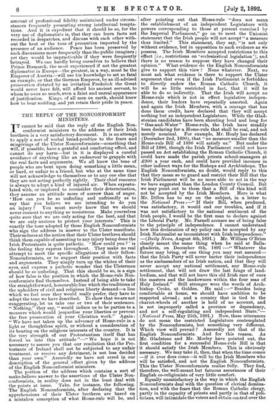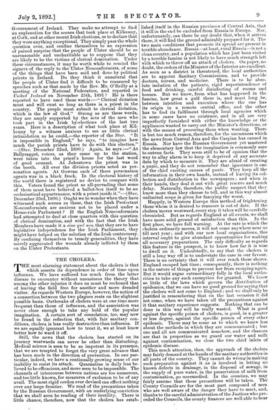• THE REPLY OF THE NONCONFORMIST MINISTERS.
IT cannot be said that the reply of the English Non- conformist ministers to the address of their Irish brethren is a very satisfactory document. It is an attempt to apply a sort of verbal bread-poultice to the fears and misgivings of the Ulster Nonconformists—something that will, if possible, have a grateful and comforting effect, and cannot do any harm—but in it is displayed a careful avoidance of anything like an endeavour to grapple with the real facts and arguments. We all know the tone of people who are bent upon doing something a little mean, or hard, or unfair to a friend, but who at the same time will not acknowledge to themselves or to any one else that they are not acting perfectly rightly. Their chief resource is always to adopt a kind of injured air. When expostu- lated with, or implored to reconsider their determination, they assume an attitude more of sorrow than of anger. How can you be so unfeeling and unfriendly as to say that you believe we are intending to do you an injury ? You must surely know that we should never consent to anything so monstrous. Make yourselves quite sure that we are only acting for the best, and that we are only anxious to protect your interests.' This is exactly the tone adopted by those English Nonconformists who sign the address in answer to the 'Ulster manifesto. Their sadness at the notion that their Ulster brethren should think them capable of assenting to any injury being done the Irish Protestants is quite pathetic. How could you ? ' is the feeling they express throughout. They make no real attempt to meet the specific allegations of their fellow- Nonconformists, or to support their position with facts and arguments. They simply turn up the whites of their eyes, and express a pathetic wonder that the Ulstermen should be so unfeeling. That this should be so, is a sign of how false is the position in which the Home-rule Non- conformists find themselves. Instead of being able to take the straightforward, honourable line which the traditions of the upholders of civil and religious liberty demand—a line which we feel sure they would really prefer, they have to adopt the tone we have described. To show that we are not exaggerating, let us take one or two of their sentences. -" Nothing," they say, "would induce us to be parties to a measure which would jeopardise your liberties or prevent the free prosecution of your Christian work." Again : 4‘ We have not taken up the advocacy of Home-rule in a light or thoughtless spirit, or without a consideration of its bearing on the religious interests of the country. It is the very strength of our Protestantism itself that has forced us into this attitude "—" We hope it is not necessary to assure you that our resolution that the Pro- testants of Ireland shall not be subjected to any unfair treatment, or receive any detriment, is not less decided -than your own." Assuredly we have not erred in our description of the general -effect given by the address of the English Nonconformist ministers. The portion of the address which contains a sort of make-believe answer to the assertions of the Ulster Non- conformists, in reality does not in the least deal with the points at issue. Take, for instance, the following. The English Nonconformists, after declaring that the apprehensions of their Ulster brethren are based on a mistaken conception of what Home-rule will be, and amount of professional fidelity maintained under circum- after pointing out that Home-rule "does not mean the establishment of an independent Legislature with powers corresponding to those at present exercised by the Imperial Parliament," go on to meet the Unionist statement that the Irish people will not accept " a measure thus limited." This statement, they say, "is not only without evidence, but in opposition to such evidence as we possess. The Irish Members accepted restrictions to this effect [i.e., restrictions on ecclesiastical legislation'], and there is no reason to suppose they have changed their opinion." What evidence do the English Nonconformists give to support this view ? None whatever. Next, we must ask what evidence is there to support the Ulster argument that even if the Irish Parliament is forbidden to directly endow the Roman Catholic Church, it will be so little restricted in fact, that it will be able to do so indirectly. That the Irish will accept no Home-rule which is not in effect legislative indepen- dence, their leaders have repeatedly asserted. Again and- again the Irish Members, with a courage that has done them credit, have declared that they will accept nothing but an independent Legislature. While the Glad- stonian candidates have been shouting loud and long for " Gas-and-Water " Home-rule, the Irish have steadily been declaring for a Home-rule that shall be real, and not merely nominal. For example, Mr. Healy has declared (December 2nd, 1890), that "no measure smaller than the Home-rule Bill of 1886 will satisfy us." But under the Bill of 1886, though the Irish Parliament could not have passed an Act establishing the Roman Catholic Church, it could have made the parish priests school-managers at £300 a year each, and could have provided incomes in other indirect ways for the Bishops and Archbishops. The English Nonconformists, no doubt, would reply to this that they mean so to guard and restrict their Bill that the Irish Parliament will be no more able to act in the way we have suggested than the London County Council. But we may point out to them that a Bill of this kind. will not be accepted by the Irish Members. Here is what Mr. Dillon has to say on the subject, in a letter to the National Press If their Bill, when produced, was satisfactory, it would end our troubles, and if it was not satisfactory to the national sentiment of the Irish people, I would be the first man to declare against the Liberal Party. Mr. Parnell accuses me of being false to the principle of independence. I cannot understand how this declaration of my policy can be accepted by any Irish Nationalist as inconsistent with Irish independence." —(Daily News, August 4th, 1891.) Mr. William O'Brien clearly meant the same thing when he said at Balla- ghaderin, on December 6th, 1891 :—" Whatever the future may bring, of one thing you may rest assured— that the Irish Party will never barter their independence as the ambassadors of an Irish nation, and that they will never accept any national settlement, any Home-rule settlement, that will not draw the last fangs of land- lordism, and that will not leave this old Irish race of ours the masters and the landowners within the four seas of Holy Ireland." Still stronger were the words of Arch- bishop Croke, at Golden. He said :—" Besides being comfortable at home, we should have ambition to be respected abroad ; and a country that is tied to the chariot-wheels of another is held of no account, and is not improperly called a province or dependency, and not a self-regulating and independent State."— (National Press, May 25th, 1891.) Now, these utterances do not mean the restricted Legislature contemplated by the Nonconformists, but something very different. Which view will prevail ? Assuredly not that of the English Nonconformists. And for this reason. As Mr. Gladstone and Mr. Morley have pointed out, the first condition for a successful Home-rule Bill is that it should satisfy the Irish Members. This is obviously necessary. We may take it, then, that when the time comes —if it ever does come—it will be the Irish Members who will be satisfied, and not the English Nonconformists.
This the Ulster Nonconformists realise fully. They find, therefore, the well-meant but fatuous assurances of their English co-religionists of very little comfort. Equally unsatisfactory is the way in which the English Nonconformists deal with the question of clerical domina- tion, and with the fears that the Roman Catholic clergy, partly in the capacity of priests and partly in that of poli- ticians, will intimidate the voters and obtain control over the Government of Ireland. They make no attempt to find an explanation for the scenes that took -place at Kilkenny, at Cork, and at other recent Irish elections, or to declare that they were anything exceptional. They simply pass the whole question over, and confine themselves to an expression of pained surprise that the people of Ulster should be so unreasonable and uncharitable as to suppose that they are likely to be the victims of clerical domination. Under these circumstances, it may be worth while to remind the signers of the reply to the Ulster Nonconformists, of some of the things that have been said and done by political priests in Ireland. Do they think it unnatural that the people of Ulster find it difficult to be reassured by speeches such as that made by the Rev. Mr. O'Reilly at a. meeting of the National Federation, and reported in United Ireland on November 25th, 1891? He is there reported to have used these words :—" Clerical dictation must and will exist so long as there is a priest in the country. The people must submit to clerical dictation, which is the law of God." Strong as are these words, they are amply supported by the acts of the men who took part in the Irish by-elections of the last two years. Here is a description of what took place at Kil- kenny by a witness anxious to see as little clerical intimidation as he could,—the reporter of the Star. "It is impossible in England," he says, "to imagine how much the parish priests have to do with this election." —(Star, December 22nd, 1890.) Again, he says :—" At Ballyraeget, voters, as they came up to the station, were taken into the priest's house for the last word of good counsel. At Johnstown the priest was in the booth. All over the division priests acted as per- sonation agents. At Gowran each of three personation agents was in a black frock. In the electoral history of the world there is registered no device to compare with this. Voters found the priest so all-pervading that some of them must have believed a ballot-box itself to be an ecclesiastical appurtenance, with a priest inside it."—(Star, December 23rd, 1890.) Ought we to wonder when they have witnessed such scenes as these, that the Irish Protestant Nonconformists are anxious not to be placed under a Home-rule Parliament ? If the English Nonconformists had attempted to deal at close quarters with this question of clerical domination, and with the fact that the Irish Members have made it a sine qua' non that they are to have legislative independence for the Irish Parliament, they might have helped on the solution of the Irish controversy. By confining themselves to treacly generalities, they have merely aggravated the wounds already inflicted by them on the Ulster Protestants.











































 Previous page
Previous page